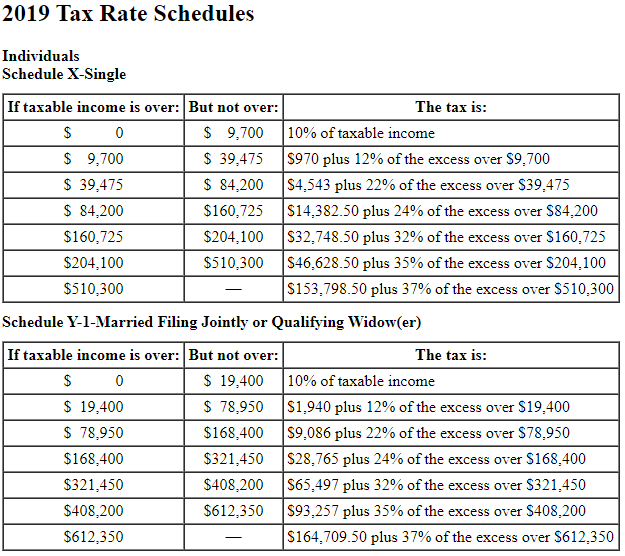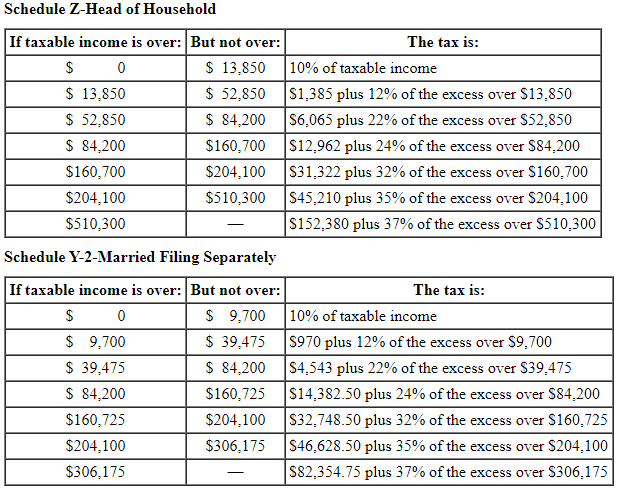Answered step by step
Verified Expert Solution
Question
1 Approved Answer
Lacy is a single taxpayer. In 2019, her taxable income is $40,000. What is her tax liability in each of the following alternative situations? Use
Lacy is a single taxpayer. In 2019, her taxable income is $40,000. What is her tax liability in each of the following alternative situations? Use Tax Rate Schedule, Dividends and Capital Gains Tax Rates for reference. (Do not round intermediate calculations. Round your answer to 2 decimal places.)



A. Her $40,000 of taxable income includes $1,000 of qualified dividends
Tax liability: __________
B. Her $40,000 of taxable income includes $5,000 of qualified dividends
Tax liability: __________
2019 Tax Rate Schedules Individuals Schedule X-Single If taxable income is over: But not over: The tax is: $ 0. $ 9,700 10% of taxable income $ 9,700 $ 39,475 S970 plus 12% of the excess over $9.700 $ 39,475 $ 84,200 $4,543 plus 22% of the excess over $39,475 $ 84,200 | $160,725 S14,382.50 plus 24% of the excess over $84.200 $160,725 $204,100 $32.748.50 plus 32% of the excess over $160,725 $204,100 $510,300 $46.628.50 plus 35% of the excess over S204.100 $510,300 - $153,798.50 plus 37% of the excess over $510,300 Schedule Y-1-Married Filing Jointly or Qualifying Widow(er) If taxable income is over: But not over: The tax is: $ 0 $ 19,400 10% of taxable income $ 19,400 $ 78,950 $1,940 plus 12% of the excess over $19,400 $ 78,950 $168,400 $9,086 plus 22% of the excess over $78,950 $168.400 $321,450 $28.765 plus 24% of the excess over $168.400 $321,450 $408,200 $65,497 plus 32% of the excess over $321,450 $408.200 $612,350 $93.257 plus 35% of the excess over $408.200 $612,350 - $164,709.50 plus 37% of the excess over $612,350 Schedule Z-Head of Household If taxable income is over: But not over: The tax is: $ 0. $ 13,850 10% of taxable income $ 13,850 $ 52,850 $1,385 plus 12% of the excess over $13.850 $ 52,850 $ 84,200 56,065 plus 22% of the excess over $52.850 $ 84,200 $160,700 $12.962 plus 24% of the excess over $84,200 $160,700 $204,100 $31,322 plus 32% of the excess over $160,700 $204,100 $510,300 $45,210 plus 35% of the excess over $204,100 $510,300 - $152,380 plus 37% of the excess over $510,300 Schedule Y-2-Married Filing Separately If taxable income is over: But not over: The tax is: $ 0 $ 9,700 10% of taxable income $ 9,700 $ 39,475 $970 plus 12% of the excess over $9,700 $ 39,475 $ 84,200 $4,543 plus 22% of the excess over $39,475 $ 84,200 $160,725 $14.382.50 plus 24% of the excess over $84,200 $160,725 $204,100 $32.748.50 plus 32% of the excess over $160.725 $204,100 $306,175 $46,628.50 plus 35% of the excess over $204,100 $306,175 - $82,354.75 plus 37% of the excess over $306,175 Tax Rates for Net Capital Gains and Qualified Dividends Rate | 0% 15% 20% Married Filing Jointly $0 - $78.750 $78.751 - $488.850 $488.851+ Married Filing Separately $0-$39,375 $39,376 - $244,425 $244,426+ Taxable Income Single SO - $39,375 $39,376 - $434.550 $434.551+ Head of Household $0 - $52,750 $51,751 - $461,700 $461,701+ Trusts and Estates SO - $2.650 $2,651 - $12.950 $12.951+Step by Step Solution
There are 3 Steps involved in it
Step: 1

Get Instant Access to Expert-Tailored Solutions
See step-by-step solutions with expert insights and AI powered tools for academic success
Step: 2

Step: 3

Ace Your Homework with AI
Get the answers you need in no time with our AI-driven, step-by-step assistance
Get Started


